PEP小学英语六年级下册 unit
- 格式:pptx
- 大小:3.30 MB
- 文档页数:22
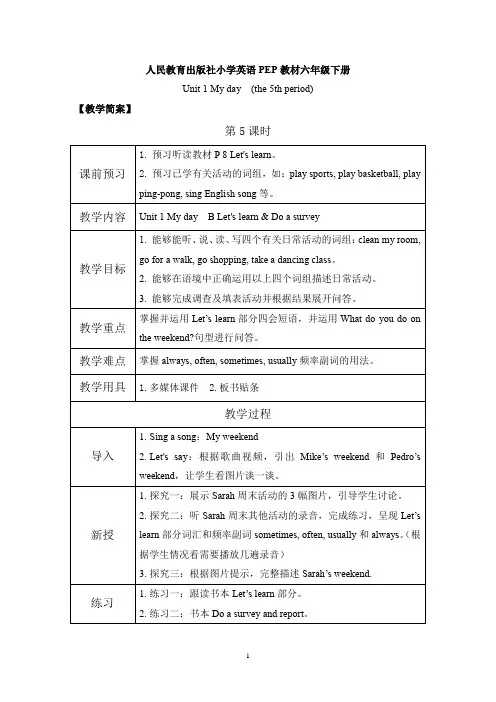
人民教育出版社小学英语PEP教材六年级下册Unit 1 My day (the 5th period)【教学简案】第5课时【教学详案】课前预习:1.预习听读教材P 8 Let's learn。
2.预习已学有关活动的词组,如:play sports, play basketball, play ping-pong, sing English song等。
教学内容:Unit 1 My day B Let's learn & Do a survey教学目标:1. 能够能听、说、读、写四个有关日常活动的词组:clean my room, go for a walk, go shopping, take a dancing class。
2. 能够在语境中正确运用以上四个词组描述日常活动。
3. 能够完成调查及填表活动并根据结果展开问答。
教学重点:掌握并运用Let’s learn部分四会短语,并运用What do you do on the weekend?句型进行问答。
教学难点:掌握always, often, sometimes, usually频率副词的用法。
教学用具:1.多媒体课件 2. 板书贴条教学过程:一、Warming up1. Sing a song:My weekend2. Let’s say:根据歌曲视频,引出Mike’s weekend和Pedro’s weekend,让学生看图片谈一谈。
T: In the video, we sang about Pedro and Mike’s weekend. Look at this picture. If you are Mike, can you talk about his weekend?S: I often clean my room on the weekend. (板书often)S: I sometimes go shopping on the weekend. (板书sometimes)T: What about Pedro’s weekend?(指着Pedro的图片提问)S: I usually play football and play basketball on the weekend.(板书usually)T: Right. We can also say Pedro usually plays sports on the weekend.设计意图:歌曲活跃课堂气氛,营造轻松学习氛围,吸引学生的注意力,为学生学习课文词组和语言表达做铺垫;以歌曲中人物活动作为引子,帮助学生回顾所唱的内容,为后面学习相关周末活动做铺垫;其次,运用图片中的星级标注引出3个频率副词,将抽象内容具体化,有助于学生对虚词的理解。
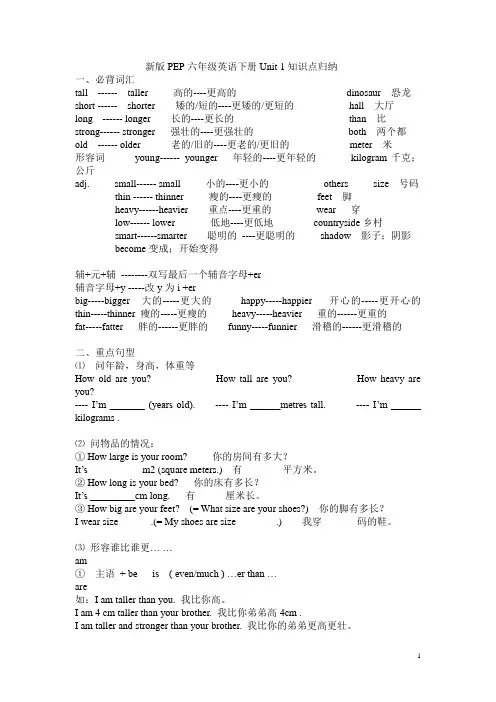
新版PEP六年级英语下册Unit 1知识点归纳一、必背词汇tall ------ taller 高的----更高的dinosaur 恐龙short ------ shorter 矮的/短的----更矮的/更短的hall 大厅long ------ longer 长的----更长的than 比strong------ stronger 强壮的----更强壮的both 两个都old ------ older 老的/旧的----更老的/更旧的meter 米形容词young------ younger 年轻的----更年轻的kilogram千克;公斤adj. small------ small 小的----更小的others size 号码thin ------ thinner 瘦的----更瘦的feet 脚heavy------heavier 重点----更重的wear 穿low------ lower 低地----更低地countryside乡村smart------smarter 聪明的----更聪明的shadow 影子;阴影become变成;开始变得辅+元+辅--------双写最后一个辅音字母+er辅音字母+y -----改y为i +erbig-----bigger 大的-----更大的happy-----happier 开心的-----更开心的thin-----thinner 瘦的-----更瘦的heavy-----heavier 重的------更重的fat-----fatter 胖的------更胖的funny-----funnier 滑稽的------更滑稽的二、重点句型⑴问年龄,身高,体重等How old are you? How tall are you? How heavy are you?---- I’m _______ (years old). ---- I’m ______metres tall. ---- I’m ______ kilograms .⑵问物品的情况:① How large is your room? 你的房间有多大?It’s __________ m2 (square meters.) 有_______ 平方米。
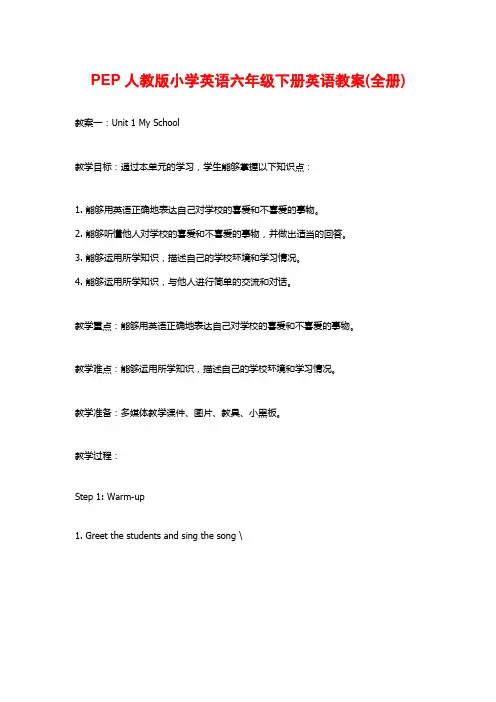
PEP人教版小学英语六年级下册英语教案(全册) 教案一:Unit 1 My School
教学目标:通过本单元的学习,学生能够掌握以下知识点:
1. 能够用英语正确地表达自己对学校的喜爱和不喜爱的事物。
2. 能够听懂他人对学校的喜爱和不喜爱的事物,并做出适当的回答。
3. 能够运用所学知识,描述自己的学校环境和学习情况。
4. 能够运用所学知识,与他人进行简单的交流和对话。
教学重点:能够用英语正确地表达自己对学校的喜爱和不喜爱的事物。
教学难点:能够运用所学知识,描述自己的学校环境和学习情况。
教学准备:多媒体教学课件、图片、教具、小黑板。
教学过程:
Step 1: Warm-up
1. Greet the students and sing the song \。
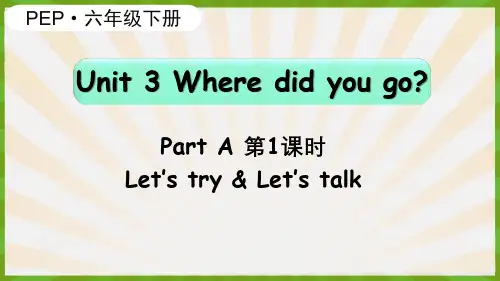
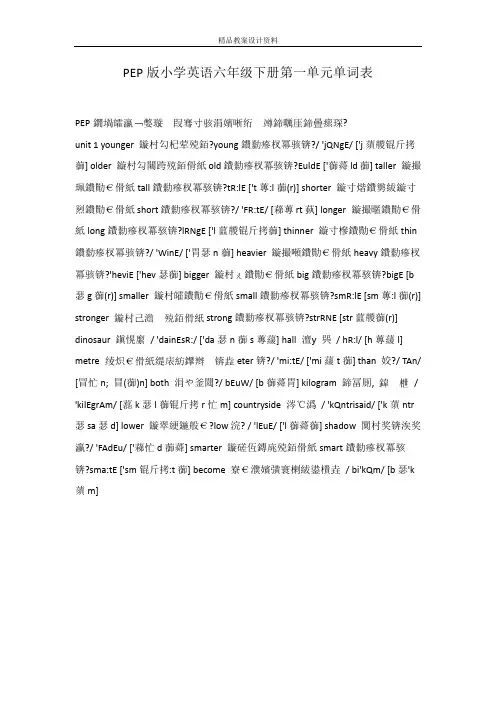
精品教案设计资料PEP版小学英语六年级下册第一单元单词表PEP?unit 1 younger 鏇村勾杞荤殑銆?young鐨勬瘮杈冪骇锛?/ 'jQNgE/ ['j蕦艐锟斤拷蓹] older 鏇村勾闀跨殑銆傦紙old鐨勬瘮杈冪骇锛?EuldE ['蓹蕣ld蓹] taller 鏇撮珮鐨勩€傦紙tall鐨勬瘮杈冪骇锛?tR:lE ['t蓴:l蓹(r)] shorter 鏇寸煯鐨勶紱鏇寸煭鐨勩€傦紙short鐨勬瘮杈冪骇锛?/ 'FR:tE/ [蕛蓴rt蓺] longer 鏇撮暱鐨勩€傦紙long鐨勬瘮杈冪骇锛?lRNgE ['l蓲艐锟斤拷蓹] thinner 鏇寸槮鐨勩€傦紙thin 鐨勬瘮杈冪骇锛?/ 'WinE/ ['胃瑟n蓹] heavier 鏇撮噸鐨勩€傦紙heavy鐨勬瘮杈冪骇锛?'heviE ['hev瑟蓹] bigger 鏇村ぇ鐨勩€傦紙big鐨勬瘮杈冪骇锛?bigE [b 瑟g蓹(r)] smaller 鏇村皬鐨勩€傦紙small鐨勬瘮杈冪骇锛?smR:lE [sm蓴:l蓹(r)] stronger strong鐨勬瘮杈冪骇锛?strRNE [str蓲艐蓹(r)] dinosaur 鎭愰緳/ 'dainEsR:/ ['da瑟n蓹s蓴藧] hall 澶у巺/ hR:l/ [h蓴藧l] metre eter锛?/ 'mi:tE/ ['mi藧t蓹] than 姣?/ TAn/ [冒忙n; 冒(蓹)n] both 涓や釜閮?/ bEuW/ [b蓹蕣胃] kilogram 鍗冨厠, / 'kilEgrAm/ [藞k瑟l蓹锟斤拷r忙m] countryside 涔℃潙/ 'kQntrisaid/ ['k蕦ntr 瑟sa瑟d] lower 鏇翠綆鍦般€?low浣? / 'lEuE/ ['l蓹蕣蓹] shadow 闃村奖锛涘奖瀛?/ 'FAdEu/ ['蕛忙d蓹蕣] smarter 鏇磋仾鏄庣殑銆傦紙smart鐨勬瘮杈冪骇锛?sma:tE ['sm锟斤拷:t蓹] become 寮€濮嬪彉寰楋紱鍙樻垚/ bi'kQm/ [b瑟'k 蕦m]。
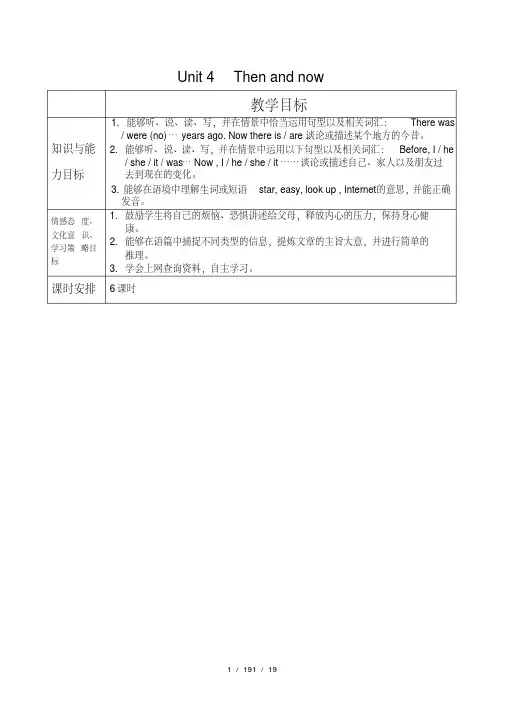
Unit 4 Then and now教学目标知识与能力目标1. 能够听、说、读、写,并在情景中恰当运用句型以及相关词汇:There was/ were (no) … years ago. Now there is / are ..谈论或描述某个地方的今昔。
2. 能够听、说、读、写,并在情景中运用以下句型以及相关词汇:Before, I / he/ she / it / was… Now , I / he / she / it ……谈论或描述自己、家人以及朋友过去到现在的变化。
3. 能够在语境中理解生词或短语star, easy, look up , Internet 的意思,并能正确发音。
情感态度、文化意识、学习策略目标1.鼓励学生将自己的烦恼、恐惧讲述给父母,释放内心的压力,保持身心健康。
2.能够在语篇中捕捉不同类型的信息,提炼文章的主旨大意,并进行简单的推理。
3.学会上网查询资料,自主学习。
课时安排6课时第一课时教学内容A.Let’s try Let’s talk课型对话教学教学目标1.学生能理解对话大意并能正确朗读所学对话。
2.能在图片的帮助下,在情景中运用There be 句型,用3—5句话描述某个地方过去与现在的状态和变化。
3.能理解one day , look it up, in my time , Internet 的意义和用法,并能正确发音。
4.了解为类首次登月的一些信息。
教学重点能在图片的帮助下,在情景中运用There be 句型,用3—5句话描述某个地方过去与现在的状态和变化。
教学难点能理解one day , look it up, in my time , Internet 的意义和用法,并能正确发音。
教学准备课件、图片教学过程:Step 1: Warm-up1.教师出示图片,复习学校设施单词如:library, computer room, art room……2.教师将单词卡片发给学生,模拟“萝卜蹲”游戏。
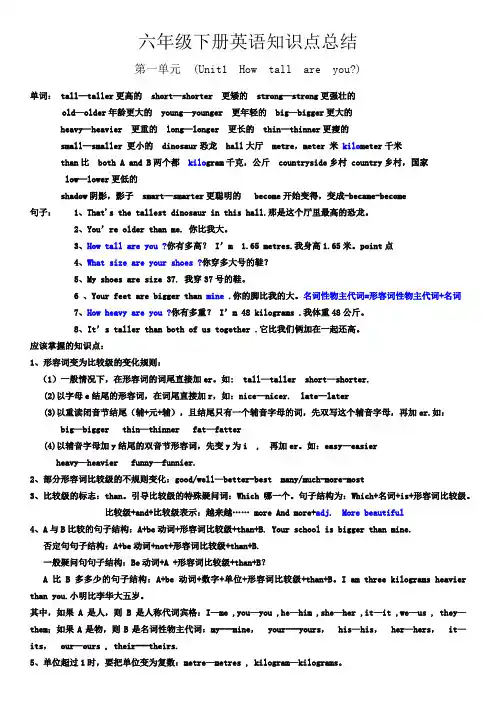
六年级下册英语知识点总结第一单元(Unit1 How tall are you?)单词: tall—taller更高的short—shorter 更矮的strong—strong更强壮的old—older年龄更大的young—younger 更年轻的big—bigger更大的heavy—heavier 更重的long—longer 更长的thin—thinner更瘦的small—smaller 更小的 dinosaur恐龙 hall大厅 metre,meter 米kilo meter千米than比 both A and B两个都 kilo gram千克,公斤 countryside乡村 country乡村,国家low—lower更低的shadow阴影,影子 smart—smarter更聪明的 become开始变得,变成-became-become句子: 1、That's the tallest dinosaur in this hall.那是这个厅里最高的恐龙。
2、You’re older than me. 你比我大。
3、How tall are you ?你有多高? I’m 1.65 metres.我身高1.65米。
point点4、What size are your shoes ?你穿多大号的鞋?5、My shoes are size 37. 我穿37号的鞋。
6 、Your feet are bigger than mine .你的脚比我的大。
名词性物主代词=形容词性物主代词+名词7、How heavy are you ?你有多重? I’m 48 kilograms .我体重48公斤。
8、It’s taller than both of us together .它比我们俩加在一起还高。
应该掌握的知识点:1、形容词变为比较级的变化规则:(1)一般情况下,在形容词的词尾直接加er。
如: tall—taller short—shorter.(2)以字母e结尾的形容词,在词尾直接加r,如:nice—nicer. late—later(3)以重读闭音节结尾(辅+元+辅),且结尾只有一个辅音字母的词,先双写这个辅音字母,再加er.如:big—bigger thin—thinner fat—fatter(4)以辅音字母加y结尾的双音节形容词,先变y为i , 再加er。
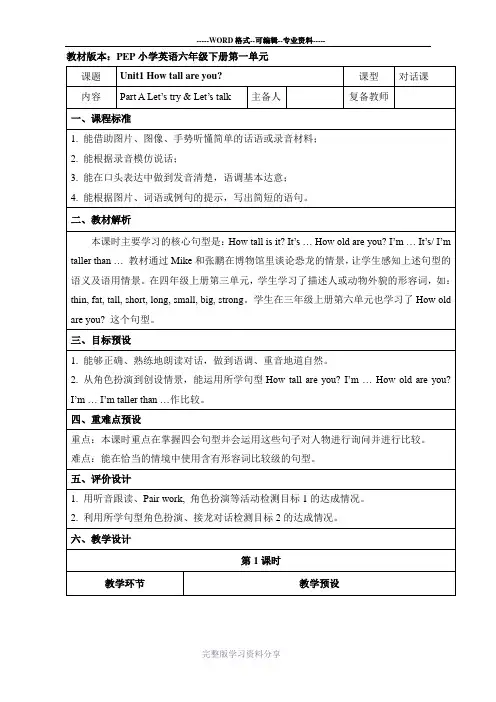
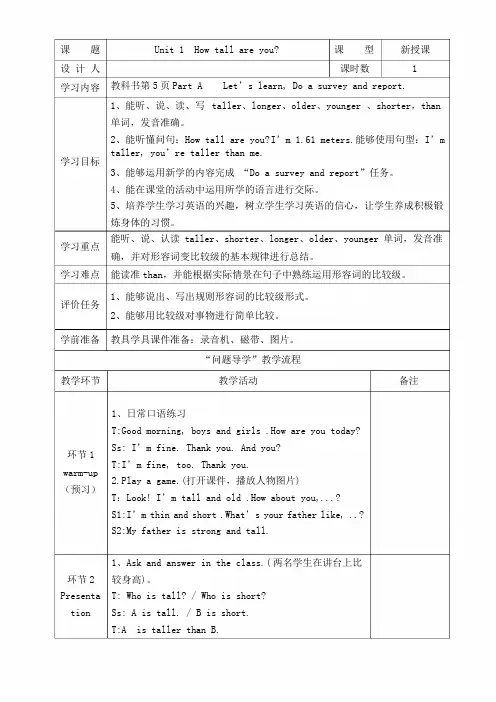
课题设计人Unit1How tall are you?课型课时数新授课1学习内容教科书第5页Part A Let’s learn,Do a survey and report.1、能听、说、读、写taller、longer、older、younger、shorter,than单词,发音准确。
2、能听懂问句:How tall are you?I’m 1.61meters.能够使用句型:I’m 学习目标taller,you’re taller than me.3、能够运用新学的内容完成“Do a survey and report”任务。
4、能在课堂的活动中运用所学的语言进行交际。
5、培养学生学习英语的兴趣,树立学生学习英语的信心,让学生养成积极锻炼身体的习惯。
学习重点能听、说、认读taller、shorter、longer、older、younger单词,发音准确,并对形容词变比较级的基本规律进行总结。
学习难点能读准than,并能根据实际情景在句子中熟练运用形容词的比较级。
评价任务1、能够说出、写出规则形容词的比较级形式。
2、能够用比较级对事物进行简单比较。
学前准备教具学具课件准备:录音机、磁带、图片。
“问题导学”教学流程教学环节环节1 warm-up (预习)环节2 Presenta tion教学活动备注1、日常口语练习T:Good morning,boys and girls.How are you today?Ss:I’m fine.Thank you.And you?T:I’m fine,too.Thank you.2.Play a game.(打开课件,播放人物图片)T:Look!I’m tall and old.How about you,...?S1:I’m thin and short.What’s your father like,..?S2:My father is strong and tall.1、Ask and answer in the class.(两名学生在讲台上比较身高)。
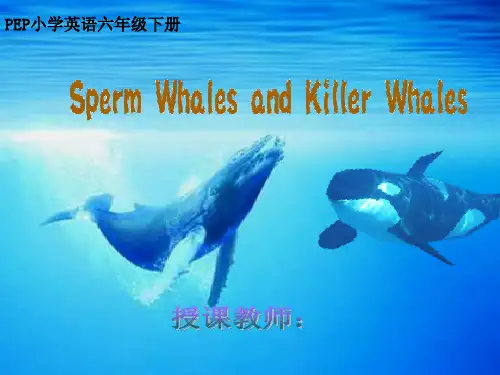
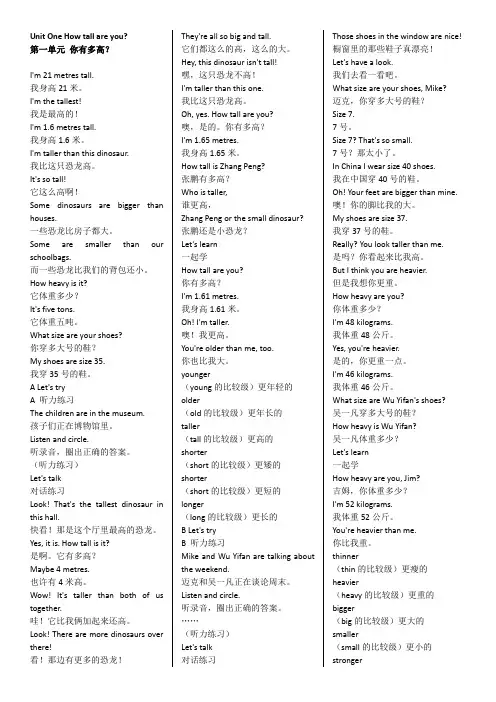
Unit One How tall are you?第一单元你有多高?I'm 21 metres tall.我身高21米。
I'm the tallest!我是最高的!I'm 1.6 metres tall.我身高1.6米。
I'm taller than this dinosaur.我比这只恐龙高。
It's so tall!它这么高啊!Some dinosaurs are bigger than houses.一些恐龙比房子都大。
Some are smaller than our schoolbags.而一些恐龙比我们的背包还小。
How heavy is it?它体重多少?It's five tons.它体重五吨。
What size are your shoes?你穿多大号的鞋?My shoes are size 35.我穿35号的鞋。
A Let's tryA 听力练习The children are in the museum.孩子们正在博物馆里。
Listen and circle.听录音,圈出正确的答案。
(听力练习)Let's talk对话练习Look! That's the tallest dinosaur in this hall.快看!那是这个厅里最高的恐龙。
Yes, it is. How tall is it?是啊。
它有多高?Maybe 4 metres.也许有4米高。
Wow! It's taller than both of us together.哇!它比我俩加起来还高。
Look! There are more dinosaurs over there!看!那边有更多的恐龙!They're all so big and tall.它们都这么的高,这么的大。
Hey, this dinosaur isn't tall!嘿,这只恐龙不高!I'm taller than this one.我比这只恐龙高。
新版PEP小学英语六年级下册全册教案Unit 1 How Tall Are You?单元学情分析本课时的教学重难点在于让学生学会用英语的比较级,并能熟练的将其运用于实际生活中,询问身边的人或者事物的年龄、身高、重量以及长度并用比较级的句型来回答。
本课时的主要语言项目是用英语表述自己的身高和体重,通过A部分五个英语词汇的掌握,把新授词汇融入到新句型当中。
教材在Let's do部分设计了三位学生的身高比较,让学生通过做动作或实际比较可以很快理解并熟练掌握这些相关内容,达到能实际运用的目的。
六年级的学生对英语学习兴趣整体有所下降,两极分化比较严重。
所以本学期应做好后进生的转化工作。
教师应该面向全体学生,以学生的发展为宗旨,始终把激发学生的学习兴趣放在首位,注意分层教学,引导学生端正学习态度,掌握良好的学习方法,培养学生良好的学习习惯。
单元教学目标:知识与技能1、通过第一单元的学习,学生能对身体或事物的高矮、大小、重轻、长短进行描述和问答。
2、四会(听、说、读、写)掌握的单词有:taller, shorter, older, younger, stronger, thinner, bigger, smaller, longer, heavier等。
四会掌握的句子有:How tall are you? I’m 164 cm tall. You’re shorter than me. You’re 4cm taller than me. How heavy are you? I’m 48kg. I’m thinner than you, and shorter.3、能够运用计量单位kg和m,能根据所给的数据,运用比较词than进行事物或身体的比较或描述。
课时教学设计课题:Unit 1 (第1课时)教学目标:知识与能力:1、能听、说、读、写taller、longer、older、younger 、shorter,than 单词,发音准确。
2020新人教版(PEP)小学英语六年级下册各单元知识点总结Unit 1 How tall are you?Here XXX:1.Regular adjectives: add -er to the end of the word.tall - XXXshort - shorterlong - longerstrong - strongerold - olderyoung - youngersmall - smallerlow - lowersmart - smarter2.Adjectives ending in -e: add -r to the end of the word.large - largerlate - latersimple - simplersafe - safer3.Adjectives XXX: double the final consonant and add -er.big - biggerXXX - XXXfat - fattersad - sadderhot - hotterwet - wetter4.Adjectives ending in -y: change the -y to -i and add -er.happy - happierheavy - XXXXXX - funnierangry - angrierXXX - XXXwindy - windierbusy - busierearly - earlierXXX:dinosaur。
hall。
than。
both。
meter。
kilogram。
size。
feet。
wear。
countryside。
shadow。
e.Here XXX:1.Asking about age。
height。
weight。
etc.How old are you?How tall are you?How heavy are you?I am (age) years old。
Unit 2 Last weekend一、单词clean打扫-- cleaned(clean 的过去式)打扫stay停留-- stayed (stay的过去式)停留wash洗—— washed 洗watch看——watched看have患病——had 患病sleep 睡觉——slept睡觉read读——read 读see 看见——saw看见last 上一个的yesterday 昨天before在…之前二、短语clean my room 打扫我的房间wash my clothes 洗衣服stay at home 呆在家里watch TV 看电视go boating 划船read a book 读书see a film 看电影have a cold 感冒sleep 睡觉(过去式slept)climb a mountain 爬山cooked dinner做饭cook noodles 面条三、句子1. How was your weekend?你周末过得怎么样?2. It was good/fine/OK,thank you.很好,谢谢!3. What did you do last weekend?你上个周末干了什么?4.I stayed at home with your grandma.我和你奶奶呆在家里.(with和谁)5. Did you do anything else?你还做了其他什么事吗?6. Yes,I cleaned my room and washed my clothes.是的,我扫了房间,还洗了衣服。
7.I want to buy the new film magazine.我想买期新的电影杂志。
8.Did you see a film?你看电影了吗?No,I didn’t .I had a cold. I stayed at home all weekend and slept.没有,我感冒了。
人教版PEP六年级英语下册Unit 1询问年龄、身高、体重等一重点词汇。
(英汉互译)(一)形容词的比较级1.更年轻的2.更年长的3.更高的4.更矮的5.更长的6.更瘦的7.更重的8.更大的9.更小的10.更强壮的11.lower12.smarter(二)名词类1.dinosaur2.hall3.metre4.kilogram5.countryside6.shadow(三)其他类1.become2.than3.both(四)短语类1.how tall2.what size3.how heavy4.how old5.have a look6.go on a trip7.go down8.lower and lower9.longer and longer二重点句子。
(汉译英)(一)询问及回答身高——你有多高?——我身高1.65米。
__________________________________________________________________ __________________________________________________________________ (二)询问及回答体重——你体重多少?——我体重49公斤。
__________________________________________________________________ __________________________________________________________________ (三)询问及回答鞋子尺码——迈克,你穿多大码的鞋?——我穿37码的鞋。
__________________________________________________________________ __________________________________________________________________(四)作比较的句子1.你的脚比我的大。
小学英语(pep)人教版六年级(下册)课文及课文翻译Unit 1, How tall are you?(Unit 1, A: Let’s talk).ZP: Look ! That’s the tallest dinosaur in this hall.(张鹏:看!那是这个厅里最高的恐龙。
)Mi: Yes, it is. How tall is it?(迈克:是的,它是。
它有多高?)ZP: Maybe 4 meters.(张鹏:可能4米。
)Mi: Wow ! It’s taller than both of us together.(迈克:哇!它比我们俩加起来还高。
)ZP: Look ! There are more dinosaurs over there ! (张鹏:看!在那边有更多的恐龙!)Mi: They’re all so big and tall.(迈克:它们都又大又高。
)ZP: Hey, this dinosaur isn’t tall ! I’m taller than this one.(张鹏:嘿,这只恐龙不高!我比这只更高。
)Mi: Oh, yes. How tall are you?(迈克:哦,是的。
你有多高?)ZP: I’m 1.65 meters.(张鹏:我身高1.65米。
)(Unit 1, B: Let’s talk)M: Those shoes in the window are nice ! Let’s have a look. (迈克:橱窗里的那些鞋很漂亮!让我们看一看。
)W: What size are your shoes, Mike?(吴斌斌:迈克,你穿多大号的鞋?)M: Size 7(迈克:7号。
)W: Size 7? That’s so small.(吴斌斌:7号?那真小。
)M: In China I wear size 38 shoes.(迈克:在中国我穿38号的鞋。
PEP小学英语六年级下册Unit2单元整体教学设计PEP小学英语六年级下册Unit2单元整体教学设计教学目标:知识目标:1.掌握本单元的词汇:fun, happy, brave, sad, scared, angry,及词组:have fun, feel happy, be brave, cry, laugh, be scared of, be angry with.2.熟练掌握本单元的句型:①How do you feel? I feelhappy/scared/angry. ②What's the matter? I'm sad/angry/scared.③I'm sorry. ④Don't be scared.能力目标:1.能够听懂老师和同学用学过的句型和词汇来表达情感和注意安全的话语。
2.能够正确运用学过的句型和词汇来描述自己和他人的情感和行为。
3.能够培养个人情感素养和注意安全问题的意识。
情感目标:1.培养学生的情感素养,使学生能够对自己的情感有所了解,能够表达自己的情感。
2.引导学生注意安全问题,提高学生的安全意识。
教学重点:1.本单元的基本词汇和句型。
2.口语交际能力的培养。
教学难点:1.声调的准确发音。
2.个人情感表达的培养。
教学方法:1.游戏教学法,材料呈现法。
2.听、说、读、写的综合训练法。
3.小组合作学习。
教学手段:1.多媒体教学设备。
2.音频和视频材料。
3.教学图片和课件。
教学环节:Step 1: Warm-up(5 minutes)1. Greeting: greet the students and ask them to greet each other.2. Free talk: ask the students how they are feeling today.3. Review: revise the vocabulary, 'happy,' 'sad,' 'scared', 'brave', and ‘angry’.Step 2: Presentation(15 minutes)1. Introduce new vocabulary: ‘fun.'2. Use pictures to explain the meaning of 'having fun'.3. Use classroom activities and games to illustrate the use of 'have fun'.4. Present new vocabulary: ‘laugh.’5. Use pictures, videos, and activities to introduce the meaning of ‘laugh.'Step 3: Practice(20 minutes)1. Divide students into pairs or small groups.2. Ask them to practice asking and answering the question. How do you feel?3. Ask the students to practice using the new vocabulary: 'fun' and 'laugh'.4. Call on a few students to present their practice in front of the class.Step 4: Consolidation(10 minutes)1. Review the new vocabulary: 'fun' and 'laugh’.2. Ask the students to give examples of actions that make them feel happy.3. Ask the students to give examples of actions that make them'laugh'.Step 5: Extension(5 minutes)1. Ask students to practice asking and answering 'What's the matter?' and 'I'm sorry.'2. Ask the students to practice using the new vocabulary in sentences.Step 6: Summary and Homework(5 minutes)1. Summary: summarize the key points taught in the lesson.2. Homework: ask students to practice using the new vocabulary at home.教学评价:1.通过本节课的学习,学生能够准确掌握本单元的重点词汇和句型。